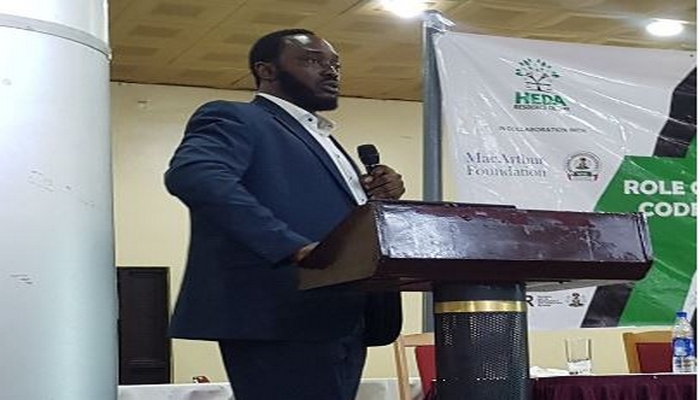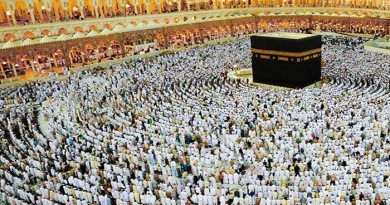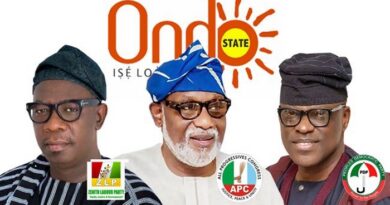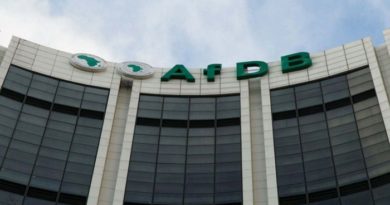‘N2trn stolen yearly in Nigeria by officials’-Experts alleged
Experts have alleged that about N2 trillion is stolen every year in Nigeria by public and private officials, usually with the technical assistance of professionals.
In a statement on Sunday, the Chairman, Human and Environmental Development Centre (HEDA) Resource Centre, Mr Olanrewaju Suraju, said that this was the view of experts and participants during a summit in Abuja at the 24th Anti-Corruption Situation Room (ACSR) with the theme: Role of professional associations, ethics, codes of conduct and sanctions in the fight against corruption, organised by HEDA with the support of MacArthur Foundation.
Suraju said that the participants at the summit said Nigeria has about 107 registered professional groups and that some of the members allegedly are enablers of corruption.
He identified participants and experts at the event to include representatives the Independent Corrupt Practices and other related Offences Commission (ICPC), United Nations Office of Drug and Crime (UNODC), Presidential Advisory Committee Against Corruption (PACAC), National Orientation Agency (NOA), Nigerian Bar Association (NBA) and Civil Society Organisations (CSOs).
He added that representatives of professional bodies at the event were Mohammed Abba, Nigeria Institute of Quantity Surveyors (NIQS), Sir Emmanuel Wike, Nigeria Institute of Estate Surveyors and Valuers (NIESV) Nigerian Union of Journalists, (NUJ), Soji Akpampa of Integrity, Dr. Akubuiro of Chartered Institute of Loan and Risk Management (CILRM), Olatunde Amolegbe, Chartered Institute of Stockbrokers (CIS), Prof. Ejiofor Chinedum, Institute of Chartered Economics of Nigeria, (ICEN) among many others.
According to Suraju, for the first time in recent memory, Nigerian professionals, civil society organisations, media and anti-corruption agencies during the summit forged a new historic partnership aimed at stemming over N2 trillion allegedly stolen every year in Nigeria’s public and private sectors.
He stated that the country’s main professional groups at the conference committed themselves to collaborating with anti-corruption institutions and civil society working on anti-corruption.
He noted that with the new partnership, it will no longer be business as usual for professionals who aid crooks in public and private sectors.
The participants, he said, urged the Federal Government of Nigeria to inaugurate the National Procurement Council (NPC), expected to have 11 members, five from the government and six from the public, established to strengthen the Public Procurement Act and ensure transparency in the award of contracts by MDAs.
He further said they also urged the Economic and Financial Crimes Commission, (EFCC) and Independent Corrupt Practices and Other Related Offenses Commission, (ICPC) to make examples from a few professionals as a deterrent and to ensure compliance with professional accountability in all spheres of public and private administration.
He added that they also called on FG to ensure that repatriation of illicit funds through Mutual Legal Assistance (MLA) should include sanctions on professionals at home and abroad who aid corruption.
Suraju, in his opening address, said corruption continues to be of major concern in Nigeria as the country searches for growth, development and stability.
He said in the past few years, various anti-corruption groups have recorded significant milestones but that in spite of the noticeable efforts of Nigeria’s anti-graft agencies, corruption remains a recurrent decimal spurring a string of socio-political ills threatening democracy.
He stated further that while professional groups continue to run the country in many spheres, with momentous contributions to the advancement of the country, it is noteworthy that one of the major enablers of corruption in Nigeria allegedly are members of professional associations that provide technical skills which aid corrupt private and public officials.
He quoted a Senior Advocate of Nigeria, Mr Femi Falana, as having said at the summit that every stolen wealth allegedly has the connivance of Nigerian professionals, either as accountants, lawyers, engineers and quantity surveyors who procure inferior building materials, medical doctors that procure health certificates to aid corrupt officials who feign collapse in courts, bankers, auditors and even journalists who give frivolous awards to stupendously corrupt political figures.
According to Suraji, a former Director General of the Inter-Governmental Agency Against Money Launder and terrorist Financing in West Africa (GIABA), Prof. Shehu Abdullahi, spoke on Interventions from key state actors, development partners and non state actors.
He stated that Abdullahi, who doubles as the Nigerian Ambassador to Russia said the future of transparency and accountability hinges on high moral standards of Nigerian professional bodies.
He added that government’s efforts will not fully succeed if professionals continue to offer professional services to dubious officials.
Dr. Gbenga Oduntan of Kent University, United Kingdom, who according to him, addressed the participants, spoke on ‘Enablers of illicit asset and corruption: Role of professional bodies in preventing, tracing and recovering illicit wealth.’
Suraji stated that in the communique issued at the end of the summit, participants said it was high time the anti-graft agencies took the anti-corruption battle to the field of professionals in various sectors of the economy.
He said, “Professionals should join the anti-corruption crusade in line with the relevant sections of the constitution in Section 15 (5) and section 24 which mandates the state, professional groups and the public to fight corruption as a legal obligation, they should self regulate to ensure the conduct of their members does not lubricate the corruption mill while at the same time reviewing their internal code of conduct mechanism, while training their members to meet the changing pattern of local and global corruption practices that affect Nigeria, participants stated in the communique.
It said that younger members in professional bodies and the would-be professionals should be engaged in the accountability-driven renaissance in their relevant institutions and associations.
“The groups urged professional and civil society groups to collaborate with the Office of the Auditor General of the Federation to strengthen and promote a public accountability regime, adding that efficiency of professional institutions can be negatively affected by weak legal framework.
“They called on the Ministry of Justice to have a department that focuses on banks and financial institutions to deal with professional misconducts.”
He added, “The National Assembly, the State Houses of Assembly and the Judiciary should enjoy financial autonomy to strengthen professional conducts of judges as contained in Section 121 of the Nigerian Constitution while State Governors should comply with the relevant provision of the law.
Ethics and moral philosophy should be ingrained in educational curriculum in primary and tertiary institutions to nurse a sustained culture of transparency and truth in generations of Nigerians.
“Participants expressed profound appreciation to HEDA Resource Centre and its partners for their consistent campaign against corruption, especially for this historic focus on professionals, opening a new and unique frontier in the collective drive to free Nigeria from the stifling grip of corruption and all its associated vices.”




